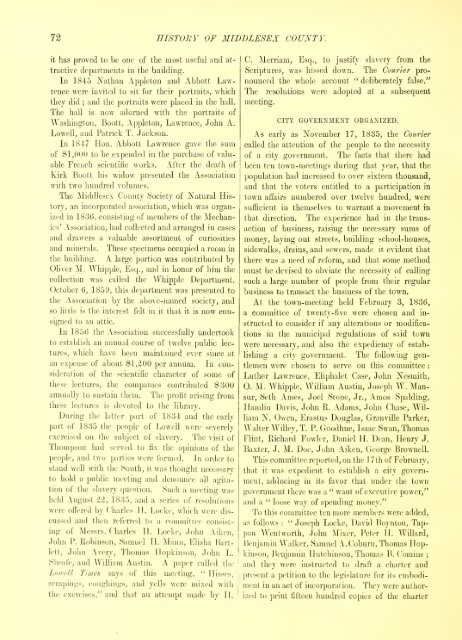History of Middlesex County, Massachusetts - citizen hylbom blog
History of Middlesex County, Massachusetts - citizen hylbom blog
History of Middlesex County, Massachusetts - citizen hylbom blog
Create successful ePaper yourself
Turn your PDF publications into a flip-book with our unique Google optimized e-Paper software.
72 HISTORY OF MIDDLESEX COUNTY.<br />
it has proved to be one <strong>of</strong> the most useful and at-<br />
tractive departments in the building.<br />
In 1845 Nathan Appleton and Abbott Lawrence<br />
were invited to sit for their portraits, which<br />
they did ; and tlie portraits were placed in the hall.<br />
The hall is now adorned with the portraits <strong>of</strong><br />
Washington, Boott, Appleton, Lawrence, John A.<br />
Lowell, and Patrick T. Jackson.<br />
Li 1847 Hon. Abbott Lawrence gave the sum<br />
<strong>of</strong> $1,000 to be expended in the purchase <strong>of</strong> valu-<br />
able French scientific works. After the death <strong>of</strong><br />
Kirk Boott his widow presented the Association<br />
with two hundred volumes.<br />
The Middlese.v <strong>County</strong> Society <strong>of</strong> Natural His-<br />
tory, an incorporated association, whicii was organized<br />
in 1836, consisting <strong>of</strong> members <strong>of</strong> the Mechan-<br />
ics' Association, had collected and arranged in cases<br />
and drawers a valuable assortment <strong>of</strong> curiosities<br />
and minerals. These specimens occupied a room in<br />
the building. A large portion was contributed by<br />
Ohver M. Whipple, Esq., and in honor <strong>of</strong> him tiie<br />
collection was called the Wiiipple Department.<br />
October 6, 1859, this department was presented to<br />
the Association by the above-named society, and<br />
so little is the interest felt in it that it is now con-<br />
signed to an attic.<br />
In 1856 the Association successfully undertook<br />
to establish an annual course <strong>of</strong> twelve public lec-<br />
tures, which have beeu maintained ever since at<br />
an expense <strong>of</strong> about $1,200 per annum. In con-<br />
sideration <strong>of</strong> the scientific character <strong>of</strong> some <strong>of</strong><br />
these lectures, the companies contributed $300<br />
annually to sustain them. The pr<strong>of</strong>it arising from<br />
these lectures is devoted to the library.<br />
During the latter part <strong>of</strong> 1834 and the early<br />
part <strong>of</strong> 1835 the people <strong>of</strong> Lowell were severely<br />
exercised on the subject <strong>of</strong> slavery. The visit <strong>of</strong><br />
Thompson had served to fix the opinions <strong>of</strong> the<br />
people, and two parties were formed. In order to<br />
stand well with the South, it was thought necessary<br />
to hold a public meeting and denounce all agita-<br />
tion <strong>of</strong> the slavery (juestion. Such a meeting was<br />
held August 23, 1835, and a series <strong>of</strong> resolutions<br />
were <strong>of</strong>lered by Charles li. Locke, which were dis-<br />
cussed and then referred to a committee consist-<br />
ing <strong>of</strong> Messrs. Charles H. Locke, John Aiken,<br />
John V. Robinson, Samuel H. Mann, Elisha Bart-<br />
li'tt, John Avery, Tiiomas llopkinson, Jolm L.<br />
Shcafe, and William Austin. A paper called the<br />
Lowell Times says <strong>of</strong> this meeting, " Hisses,<br />
scrapings, coughings, and yells were mixed with<br />
the exercise^s," and that an attempt made by II.<br />
C. ilerriam, Esq., to justify slavery from the<br />
Scriptures, was hissed down. The Courier pro-<br />
nounced the whole account "deliberately false."<br />
The resolutions were adopted at a subsequent<br />
meeting.<br />
CITY GOVERNMENT ORGANIZED.<br />
As early as November 17, 1835, the Courier<br />
called the attention <strong>of</strong> the people to the necessity<br />
<strong>of</strong> a city government. The facts that there had<br />
been ten town- meetings during that year, that the<br />
population had increased to over sixteen thousand,<br />
and that the voters entitled to a participation in<br />
town afiairs numbered over twelve hundred, were<br />
sufficient in themselves to warrant a movement in<br />
that direction. Tiie experience had in the trans-<br />
action <strong>of</strong> business, raising the necessary sums <strong>of</strong><br />
money, laying out streets, building school-houses,<br />
sidewalks, drains, and sewers, made it evident that<br />
there was a need <strong>of</strong> reform, and that some method<br />
must be devised to obviate the necessity <strong>of</strong> calling<br />
such a large number <strong>of</strong> people from their regular<br />
business to transact the business <strong>of</strong> the town.<br />
At the town-meeting held February 3, 1836,<br />
a committee <strong>of</strong> twenty-five were chosen and in-<br />
structed to consider if any alterations or modifications<br />
in the municipal regulations <strong>of</strong> said town<br />
were necessary, and also the expediency <strong>of</strong> estab-<br />
lishing a city government. The following gen-<br />
tlemen were chosen to serve on this committee :<br />
Luther Lawrence, Eliphalet Case, John Nesmith,<br />
0. M. Whipple, William Austin, Joseph W. Man-<br />
sur, Setli Ames, Joel Stone, Jr., Amos Spalding,<br />
Hamlin Davis, John R. Adams, John Chase, Wil-<br />
liam N. Owen, Erastus Douglas, Granville Parker,<br />
Walter Willey, T. P. Goodhue, Isaac Swan, Thomas<br />
Flint, Richard Fowler, Daniel H. Dean, Henry J.<br />
Baxter, J. M. Doe, John Aiken, George Brownell.<br />
This committee reported, on the 1 7th <strong>of</strong> February,<br />
that it was expedient to establish a city govern-<br />
ment, adducing in its favor that under the town<br />
government there was a " want <strong>of</strong> executive power,"<br />
and a " loose way <strong>of</strong> spending money."<br />
To this committee ten more members were added,<br />
as follows " : Josej)h Locke, David Boynton, Tap-<br />
pan Wentworth, John Mixer, Peter H. Willard,<br />
Benjamin Walker, Samuel A.Coburn, Thomas llop-<br />
kinson, Benjamin Hutchinson, Thomas B. Comins ;<br />
and they were instructed to draft a charter and<br />
present a petition to the legislature for its embodiment<br />
in an act <strong>of</strong> incorporation. They were autiior-<br />
ized to print fifteen hundred copies <strong>of</strong> the cliarter

















